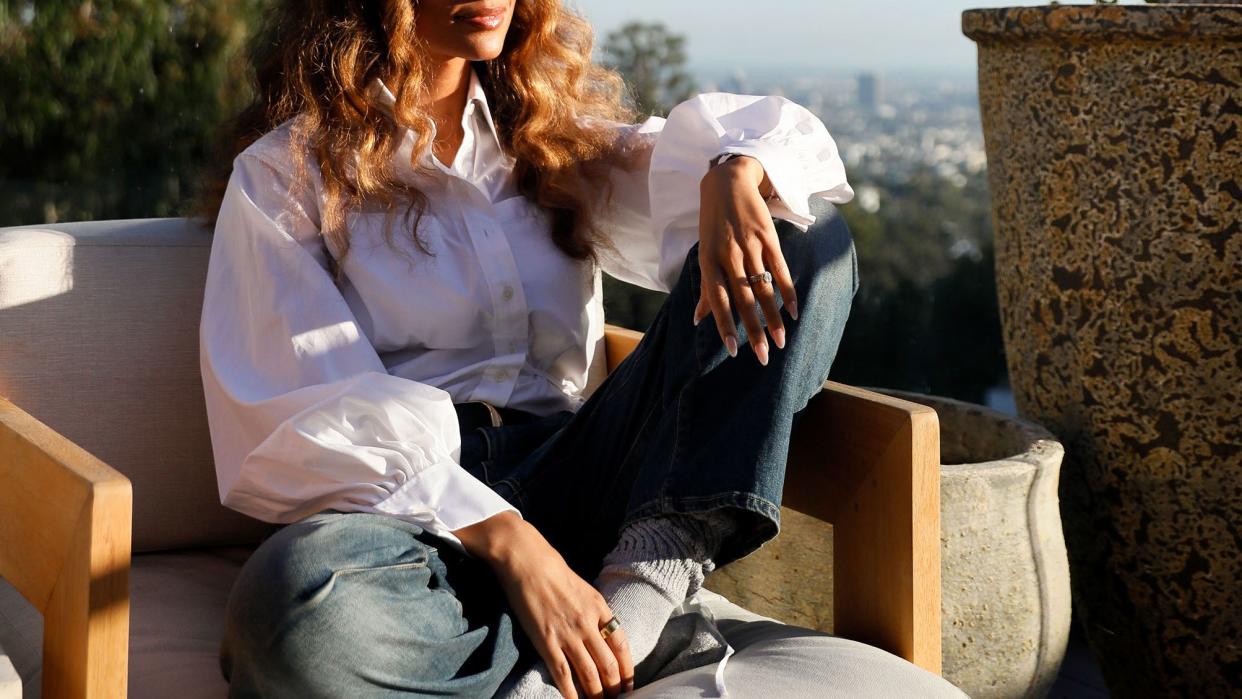Quality Maternal Healthcare Shouldn’t Be a Luxury

Creating Motherhood is a curated package of stories focused on the intersection of family and creativity and how to live an artful life as a parent.
Elaine Welteroth is riled up—and for good reason.
While the journalist and television personality has taken on a number of high-profile appointments and projects over the years (like a NYT bestselling memoir, a judging stint on Project Runway, and a national columnist role at The Washington Post), her latest endeavor easily might be the most important she’s embarked on.
This year, alongside high-profile investors including Serena Williams, John Legend and Chrissy Teigen and Karlie Kloss, Welteroth introduced birthFund to the world. The ambitious project—also described as a “birthcare revolution”—is not just a fundraising platform but a social movement meant to change the way we talk about and approach maternal healthcare in the United States.
The organization raises money to cover costs for mothers-to-be across the country who are in need of additional, often lifesaving birthcare via doulas and midwifery. It's doing this against the backdrop of an ongoing maternal health crisis. For years now, women from all backgrounds have digested the grim statistics that face mothers in this country: While America is one of the wealthiest nations in the world, it's also one of the deadliest to give birth in, with death rates rising year after year.
According to the Centers for Disease Control and Prevention, there are 32.9 deaths per every 100,000 births, with the likelihood of dying in childbirth notably higher if a woman is Black or a person of color. Welteroth, along with her founders, wholeheartedly believes it doesn't have to be this way. Having grown tired of waiting on the US government to pass legislation or make any sort of movement towards fixing this crisis, birthFUND is taking matters into its own hands.
"There is a misconception that your resources or your education or your network insulates you from the impact of this crisis. What I was surprised to realize is that really couldn't be further from the truth. " Welteroth tells Harper's Bazaar. "There is a socioeconomic element to this and I don't want to ignore that, but I do want to bust the myth that your financial reality can save you from this very broken maternal health system in our country.
"I had access to the best doctors in LA and the best hospitals in LA and ultimately what I realized is that there's a system breakdown," she continues. "There are cracks in the system that mothers like me fall through and the system isn't set up for patient-centered care."
A woman's birth plan is inherently personal, of course, and Welteroth and birthFund aren't here to tell women how to bring their children into the world. The overarching theme behind birthFUND is the power of choice. For Welteroth, promoting doula care isn't about dictating the right way to give birth, but rather providing an option that statistically has helped save mothers' lives. (Per Every Mother Counts, studies have shown over the years that hiring a doula makes a women less likely to require a cesarean birth, results in shorter labor periods, and overall leads to her feeling more satisfied with her birthing experience.)

"Anything that pertains to a woman's body is her choice. We deserve to make informed decisions about our healthcare and unfortunately our system has been set up in a way that's kept us really ill-informed about our own bodies and our options and access to resources," she says. "How do you make a birth plan when you don't even know what your options are? You don't know what you don't know. I want birthFUND to be a resource for new mothers and expanding families who are on that journey of exploration. I want them to feel like there's a place to go to learn more about where else to look and what kinds of questions they should be asking to feel a bit safer within the system that we've all inherited. There's such a deep need for information and education in order for us to advocate for ourselves, in order for us to even know what our choices are."
Welteroth found that working with a doula and midwife team provided her with knowledge that extended far past the delivery process. In fact, she wind up relying on her doula for help after her baby was born, rather than during labor. “The night before my birth, I was like, I feel like I got this with my husband and my midwives,” she explains. “And I ended up calling my doula and asking to transfer her hours to postpartum. It was the best decision I ever made because it allowed me to have only the people in the room that I really felt I needed and felt supported by and felt aligned with completely.”
Having control over who is in the room with you during childbirth can have a major impact on your birth narrative, according to Welteroth. "Our hope is that we can help reframe birth as a joyful, sacred experience because it can be. I know a whole lot of home birth moms who can tell you some incredibly beautiful, sacred, joyful birth experiences, and I feel really lucky to be one of them," she adds. "But it's also not just for delivery—postpartum support is vital. I learned so much from my postpartum doula about how to take care of my baby, but how to take care of myself and how to nurture myself back to health in order to be able to nurture this baby."
Providing these options and educating the masses is a top priority for birthFUND.
"What's been missing from this whole maternal health conversation is a focus on solutions. There's a certain level of awareness now, but how many times can you hear these sad stories and these alarming stats before you just shut down?" she says. "We need to galvanize the community around this call to action where people can actually help and do something about this and make change in real time. To me, that's what's been missing and that's why birthFund was born. We want to do more than just tell our stories and regurgitate these scary stats. I know so many kick-ass, effective, strategic, executive-level women, and I know that if we came together and focus on fixing this, we can do it in our lifetime."
It's also not just about keeping mothers alive during delivery. Postpartum complications can be emotionally and physically traumatizing, even fatal. "We have to also talk about birth trauma—we have this false sense of safety in the sense that as long as you birth a baby and you come home, you make it home alive, that equals a successful birth experience. That bar is way too low," adds Welteroth. "The reality is 50% of American mothers label their birth as traumatic and that doesn't have to be the case in the richest country in the world. Our conversation needs to extend beyond just saving mother's lives and keeping us alive through childbirth, but really setting up a supportive system that enables all birthing people to thrive through the childbirth experience."
Welteroth wants women to know that they have power over their birth stories and that it's okay to not have all the answers. Demystifying how to navigate the birthing industry is a lifelong mission that she knows could have an immeasurable impact.
"The most important thing in the world is keeping moms alive and keeping moms thriving, especially in a political environment where our bodies, our rights, our bodily autonomy, and our agency are under attack," says Welteroth. "It also can't stop here. We know that we need legislative and systemic change, but we also know we can't wait for it. Legislators, insurance companies, doctors are not moving quickly enough to make the changes that we need to see. We know that we're in an election year where we're in a political environment where the rollback of Roe v Wade, the rollback of reproductive rights is going to directly result in more mothers dying in childbirth because more women are being forced into a broken maternal health system."

Welteroth describes the urgent demand for change as a "proactive approach to saving lives"—and it's something that she remains hopeful about.
"Galvanizing people around the reality of where we are and waking people up to the reality of this crisis—we can move this up on the agenda for lawmakers and rally together for legislative change," she says. "We have heard enough scary birth stories. It's time to elevate beautiful, joyful birth experiences so that we know going into birth what we can hope for, what we can aim for, and what we deserve."
You Might Also Like


